After the great #FGDebate with Dr Mark McAlindon, we are delighted to announce our next #FGDebate will be with the SWiG-BSG Network Mentoring Team, Dr Cathryn Edwards (@CathrynmEdwards), Dr Jayne Eaden (@JayneEaden), Dr Penny Neild (@pneild), Dr Siwan Thomas Gibson (@SiwanTG), Dr Melanie Lockett (@lockett_dr) and Dr Alenka Brooks (@AlenkaBrooks) on Tuesday 22nd September 2015, at 8-9pm GMT and will discuss, ‘Frontline Gastroenterology: Supporting Women in Gastroenterology’.
Dr Cathryn Edwards
Dr Cathryn Edwards was appointed Consultant at Torbay Hospital, South Devon in 2002 having trained in Gastroenterology at Oxford. Prior to a career in Medicine she read Modern History (The Queen’s College, Oxford 1980-83). Her postgraduate training in medicine culminated in an MRC Fellowship supporting her D.Phil studies into mucins in the defunctioned colorectum.
Her clinical interests are IBD, the microscopic colitidies, anorexia nervosa and upper GI cancer. She became the first woman Secretary of the BSG in 2011: as BSG Senior Secretary she was responsible for running the 2014 and 2015 Annual Meetings, setting up a ‘Taster Membership’ scheme for the Society and more latterly has launched with colleagues a BSG network to support women in their Gastroenterology careers.
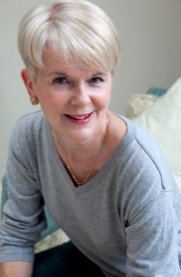
She has several national roles in IBD (National IBD Audit Steering committee; National IBD Registry Board). She was the IBD Associate Editor of Frontline Gastroenterology until 2012 and a previous Editor of the CCUK news. She is clinical lead for IBD in her own hospital, South Devon Health Care Foundation Trust.
Dr Jayne Eaden
Dr Jayne Eaden graduated in Medicine in 1992 from the University of Leicester. She undertook her Gastroenterology training in the Trent Region, receiving her CCT in 2002. During her training she spent two years out of programme, undertaking research in colorectal cancer in patients with ulcerative colitis and was awarded an MD with distinction in 2000.
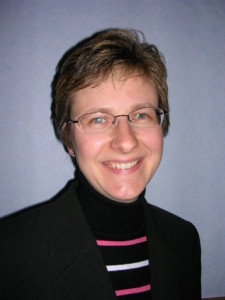
She is a co-author of the BSG & American Gastroenterology Association guidelines for cancer surveillance in IBD patients. She spent a sabbatical year in Adelaide, Australia (2000-1). She was appointed as Consultant Gastroenterologist at University Hospital Coventry & Warwickshire in 2002. Her main clinical interests are in inflammatory bowel disease, endoscopy and training. Her key roles include Trust endoscopy lead (2005-12), Trust lead for IBD (2004-), Departmental Education Lead (2006-11), Local Bowel Cancer Screening Programme Director (2006-13), Clinical Lead for gastroenterology (2009-), member and secretary of the BSG IBD Committee (2012-15) and she is now Senior Secretary of the BSG. She is an examiner and co-host for the Royal College of Physicians PACES exam. She has 40 peer-reviewed publications and is also a reviewer for Gut, Gastroenterology, Am J Gastroenterology and A, P & T.
Dr Melanie Lockett
Dr Melanie Lockett did her Gastroenterology training on the North West Thames Specialist Registrar rotation in London. She did her MD research ‘Hyperplastic polyposis, serrated polyps and the serrated colorectal cancer pathway’ with Prof Wendy Atkin at the Cancer Research UK laboratory at St Mark’s Hospital, Middlesex.
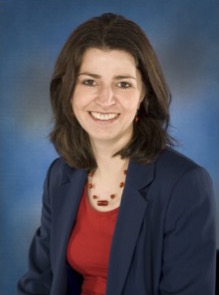
Since her appointment as a Consultant in 2005, Dr Lockett has developed her interests in luminal gastroenterology, colonoscopy, nutrition and training and is the Trust’s lead clinician for inflammatory bowel disease (IBD) and nutrition (2005 – ) as well as the Gastroenterology Specialty Tutor at Southmead Hospital (2008 – ), North Bristol NHS Trust. She is a bowel cancer screening colonoscopist for the Bristol & Weston Bowel Cancer Screening Centre (2008 – ) and is an Honorary Consultant at Cardiff & Vale University Health Board, Wales where she undertakes colonic EMR lists (2015- ). Dr Lockett was the Gastroenterology Training Programme Director to the Severn Deanery 2008 – 2013, was the deputy chair of the British Society of Gastroenterology (BSG) training committee (2011-2015), has just become the chair of this committee and is also the BSG workforce lead (2013- ).
Dr Penny Neild
Dr Penny Neild qualified in Medicine from the University of Birmingham in 1987 and moved to London after doing house jobs. She initially worked as a lecturer in Physiology at the London Hospital Medical College before undertaking a general medical training rotation in East London. She moved to Northwest Thames in 1993 to take up a training rotation in Gastroenterology. During this time Penny undertook a period of research in HIV, culminating in the award of an MD. She was appointed as a Consultant Gastroenterologist and Honorary Senior Lecturer at St. George’s Hospital in 2001.
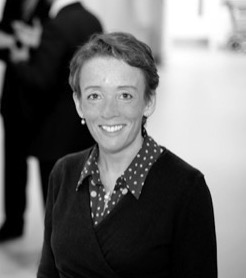
She is passionately interested in medical education, both at undergraduate and postgraduate levels. She is heavily involved in organisation and delivery of undergraduate medical teaching within St. George’s University of London, being academic lead and Chief examiner for the penultimate year of the MBBS programme. Postgraduate activities include being Associate Director for Medical Education for the Trust, as well as former Training Programme Director for Gastroenterology for South Thames and Chair of the BSG Training Committee.
She has a particular interest in nutrition and has been active in a number of national organisations to promote better education in nutrition, both at undergraduate and postgraduate level.
Penny developed an interest in mentoring as a result of her interactions with undergraduate students and trainees and the recognition of the need and potential worth of such a process. She has been involved with the London Deanery Coaching and Mentoring service since its inception in 2008 and enjoyed coaching doctors at all stages of their career, from junior trainee to senior consultant.
Dr Siwan Thomas-Gibson
Dr Siwan Thomas-Gibson graduated in Medicine in 1992 from St Mary’s Hospital, Imperial College London. She undertook her Gastroenterology training in North West London and Oxford regions, receiving my CCT in 2006. She completed her training initially full time and subsequently part-time, throughout my research and in completing my clinical training. She was a supernumerary trainee and switched regions post research to complete her training in the Oxford region.
During her training she spent three years out of programme, undertaking research in the Colonoscopy training and Assessment under the supervision of Brian Saunders and Wendy Atkin. She gained her MD in 2006. She was appointed as Consultant Gastroenterologist at St. Mark’s Hospital, Harrow, London in 2006. Her main clinical interests are in endoscopy, specifically colonoscopy, the early diagnosis of cancer, screening and therapeutic colonoscopy as well as training, safety and quality.
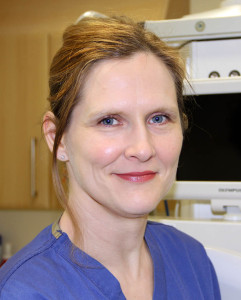
Her key roles include Trust endoscopy lead, Deputy Director Bowel Cancer Screening, previously Endoscopy Training lead and current sub-dean (Education) of St Mark’s Academic Institute. She has recently been appointed as Secretary to the BSG Endoscopy Committee. She also sits on the National Bowel Cancer Screening Accreditation panel.
Dr Alenka Brooks
Dr Alenka Brooks graduated from Sheffield University in 2001 and is currently a Clinical Research Fellow in Gastroenterology based at Sheffield Teaching Hospitals NHS Foundation Trust (STHFT). Alenka has a specialist interest in luminal gastroenterology, in particular therapeutics in inflammatory bowel disease (IBD). Her interest in clinical pharmacology developed during her time working as Associate Clinical Lecturer in Clinical Pharmacology & Therapeutics, Christchurch Public Hospital, New Zealand. The focus of Alenka’s current research funded by Crohn’s and Colitis UK is illness perceptions of young people living with IBD whist transitioning from child to adult services.

Alenka has undertaken a Leadership & Quality Improvement Fellowship where she trained as a Microsystem Coach, an executive coach and conceived a regional network; Sheffield Women in Medicine (SWiM). SWiM has over 450 members and employs 2 leadership fellows bringing together a unique collaboration of the Faculty of Medicine at The University of Sheffield, Yorkshire & Humber Health Education and STHFT to promote the careers to women in medicine regionally. In recognition of this transformational work, Alenka was awarded the Personal, Fair & Diverse Champion Individual Award by NHS Employers.
Alenka is a former chair of the Trainees Section of the British Society of Gastroenterology and in recognition of contributions to the Society she was awarded the BSG President’s Medal in 2014 and in 2015 was named BSG Young Gastroenterologist of the Year; Emerging Leader.
In advance of the #FGDebate, Dr Jayne Eaden, on behalf of the SWiG-BSG Network Mentoring Team says:
“50% of medical students are female and by 2017, women will be in the majority. Women already make up 40% of all doctors with majority working as GPs. Women are not moving into the whole range of medical specialties in proportion to their numbers. Thirty four percent of gastroenterology trainees are female. Seventeen percent of consultants are female (compared with 32% of all medical specialties). Women are under-represented as clinical researchers, full-time academics, heads of department and in all levels of NHS & university management/leadership.
In founding a professional network within the wider BSG, the primary purpose of Supporting Women in Gastroenterology (SWiG) is to define the key problems of recruitment of women to Gastroenterology and to promote the need to encourage women to step forward to senior leadership roles in their careers and in the Society itself. It is not a call for positive discrimination on behalf of the BSG, but rather a recognition that Gastroenterology as a specialty is significantly ‘behind the curve’ in terms of absolute numbers of women and their representation within the Society.
Mentoring is already widely used in both academic and clinical medicine and science to develop the careers of junior and mid career academics and doctors, especially in the United States. It’s been shown to be an especially helpful intervention to nurture, retain and develop under-represented groups. We have decided to pilot a mentoring scheme for female members of the SWIG network, in order to address the gender gap in senior roles in gastroenterology in the UK. Whilst the mentorship pilot scheme includes female mentees only as its trial group, the mentors (men and women) are being trained in this role with the longer term view, that if successful this scheme will be developed as a membership benefit for the wider society, men and women alike.”
Join us on Tuesday 22nd September 2015 8-9pm GMT for the #FGDebate!